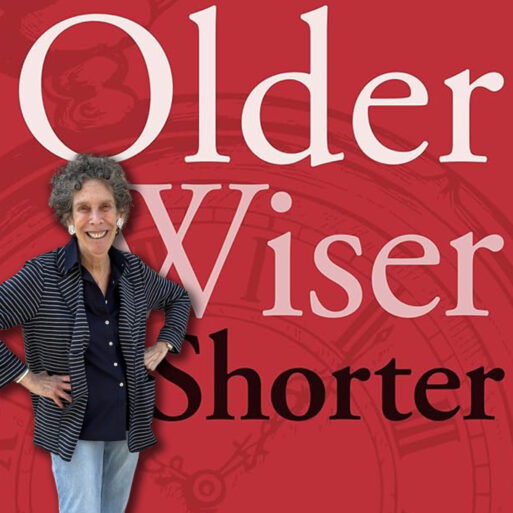
Jane Seskin is a psychotherapist and the author of 13 books, most recently the poetry collection “Older, Wiser, Shorter: The Truth and Humor of Life After 65.” Her writing has appeared in more than 40 publications, including Cosmopolitan, Woman’s Day, The New York Times, Narrative, Persimmon Tree and Women’s Older Wisdom. Her non-fiction has been anthologized in “Chicken Soup for the Soul: Get Out of Your Comfort Zone.”
Seskin’s life has taken several synchronistic turns, beginning with the fact that her writing career started by accident. Working as an elementary school teacher in Manhattan, she wrote a children’s book as her thesis while pursuing a master’s degree in education. Her professor recommended that she show it to an agent. The agent tried to sell the book, but when she couldn’t find a buyer, she asked if Seskin had anything else. She said yes, a collection of poems about what she had experienced as a young widow. It was later published as “A Time to Love,” capping a journey from teacher to published author that Seskin labeled “bizarre.”
Editor’s note: This interview has been edited for length and readability.
What was bizarre about getting your first book published?
It was kind of crazy, because I didn’t know how to write. I was just writing what I was feeling about my husband’s death. He died of leukemia. I think I just wanted to tell people what being a young widow was about. My agent sold it in one day.
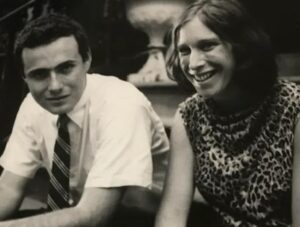
Seskin with her husband, Judd, in 1966.
How old were you when your husband died?
I was 30. He was 30. Very young — when people did not know what to do with such a young widow. I was married six years.
So how did the death of your husband at such a young age inform your worldview?
I think that it informed my worldview with the idea that even if you’re a good person and you are doing the right things, life happens and you deal with it as best you can. And that really to me is the bottom line. And it also acknowledged that I was happy. I liked being married, although I haven’t remarried. It was a good time in my life. It was the 60s. We were in Berkeley. We met on a picket line. How could you want something better?
“A Time to Love” launched a productive and successful writing career. What compelled you, as you approached middle age, to become a licensed clinical social worker?
For 15 years, I was a freelancer, and I was in the right place at the right time writing the right stuff with a very breathy, commercial voice. And then I was on a radio call-in show in Miami on a book tour. And a woman asked me a personal question, and I answered her. After I finished the interview, I was headed to the airport and I thought to myself, you have no business answering anybody about how to live their life. You are a writer. You are not prepared and you should not be telling people what to do with their lives.
So after the tour was over, I went back to my life as a freelancer and I thought to myself, is this the way I want to live my life? If I am so good at observing people, I should go and learn how to treat them. So at 38, I went to the Hunter School of Social Work. It was the best two years of my life in the worst two years of my life.
And it was wonderful. And when I completed my training, I went back to where I had been a volunteer at this organization that saw victims of violent crime [The Crime Victims Treatment Center in New York City]. I asked if they had any jobs open, and they did. Again, the right timing. So I became a counselor for crime victims, specializing in domestic violence and sexual assault. And I did that for 20 years, and I loved it.
Were you writing during this period?
I was just writing program guides.
But ultimately that experience inspired another book, “Witness to Resilience.”
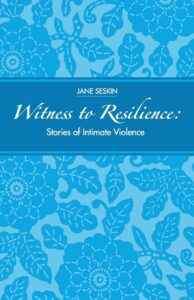 I loved the book, and I loved the work and it was important to me because I saw how people become resilient, which you need when you get older. You need to learn how to be resilient. You need to learn how to work your way out of loneliness and isolation.
I loved the book, and I loved the work and it was important to me because I saw how people become resilient, which you need when you get older. You need to learn how to be resilient. You need to learn how to work your way out of loneliness and isolation.
In your 30s, you wrote two books about how older single women could survive and thrive: Alone Not Lonely: Independent Living for Women Over 50 and More Than Mere Survival: Conversations With Women Over 65 How did what you learned then help you when you retired from full-time counseling at 60?
I think what I learned was you can live to an older age if you believe in resilience and you push yourself out the door. That means you push yourself out the door to walk around the block, to say hello to everyone, whether you know them or not, to be grateful that you’re alive, that you’re participating in life. That you allow yourself not with everyone, but with a few trusted friends, to be vulnerable, to be able to say, this is going on with me. What’s going on with you? Do you have similar feelings? So it is the idea that we’re not traveling this path alone, that we have reached out, and we have gotten some other people on our side who know who we are and are willing to go with us into whatever adventure we’re going into. And I feel very grateful that at I have managed to do that. I’ve worked very hard at doing that.
In your early 70s you began writing poems about what you were encountering emotionally and physically as a solo ager. How did that start?
When I write, I understand. So I needed to understand. And things started happening and I was thinking, oh, wow, I need to address this in some fashion. And if it meant I needed to do the poem ten times, which is my usual edit average. I would do it until I got it, so that I understood what the issue was, where I was in the issue, and then some.
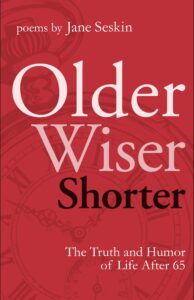 Ultimately, you ended up with a collection of funny, touching and thought-provoking poems. In terms of capturing the range of issues and emotions one has in the final chapters of one’s life, particularly from the point of view of a solo ager, I thought that you played all the keys on the piano with these 89 poems. Most of them resonated with me, even though they were written for a female audience. It must have been an easy sell.
Ultimately, you ended up with a collection of funny, touching and thought-provoking poems. In terms of capturing the range of issues and emotions one has in the final chapters of one’s life, particularly from the point of view of a solo ager, I thought that you played all the keys on the piano with these 89 poems. Most of them resonated with me, even though they were written for a female audience. It must have been an easy sell.
No publisher wanted this book when I first put it out. Not any of the big houses. Because, as one editor told me, no one wants to read about older women. I self-published “Older, Wiser, Shorter” in 2019 and the reaction was wonderful. Last year I sent it to Tallfellow Press, who knew my poems from 40 years ago, with an additional 26 poems. They did a great job in making this new revision.
Has humor always been a part of your writing?
I think it has. I don’t strive to be funny. I think funny. I think you have to have humor because otherwise, we’d all be crying, particularly when it comes to aging.
Speaking of facing aging with a sense of humor, I’m told that you use your poetry readings to create a fun, interactive atmosphere where you encourage people to express their feelings on growing older, and hopefully find some joy going forward.
It can be a powerful experience. Don’t forget I was a group leader in my social work career. Folks are encouraged to think about their lives. It’s helpful to have people respond to the poems and share their own insights, vulnerabilities and fears on aging. It’s good to be able to laugh about the quirkiness of getting older. Sometimes one will hear one sentence from myself or others that may change things for themselves. So a group is a very potent tool.
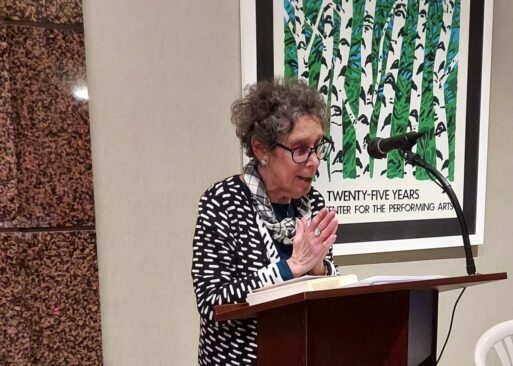
You’re currently doing workshops on how to write your own eulogy as well. What inspired that?
A friend of mine died from a heart attack and I went to her celebration of life. And they said lovely things because she was a lovely, deserving woman with many accomplishments, but no one mentioned the red helmet she wore when she rode her bike, which to me felt emblematic.
It felt like this is who she was. And so I sat down and I started thinking, what would people say about me. And then I made a list, the List of Me phrases. And then some became sentences for my eulogy. So, I thought, why don’t you just write it all down? Attach it to your will and your friends who are going to handle this, because I’m a solo ager. And maybe people will get up and tell wonderful stories of how you lived your life. So in the workshop, usually I will also ask people, what is something that no one knows about you, but now you would like to tell?
And I remember the first workshop I did, the woman next to me said, “I won a blue ribbon riding a horse.” And I said, “That’s fabulous. Who knows this?” And she said, “No one. And then I got married and then I had children, and now I have grandchildren, and no one knows that.”
And I said, “But we do. Why don’t you write that down in your List of Me? And not only that, can you make a commitment to tell someone, a family member today? Can you make that commitment?” And she looked around at the room and she said, “I make the commitment.”
That to me is glorious.
So at 80, what are you looking forward to now?
I am grateful for every day that I’m alive. This is not the time to hold back. So I don’t. I give myself an enormous amount of permission to do and to be.
Great advice for all of us. Thank you.

 Octogenarian Author Jane Seskin Offers a Model for Aging and Living Well
Octogenarian Author Jane Seskin Offers a Model for Aging and Living Well


 National Donate Life Month Reminds Us To Give
National Donate Life Month Reminds Us To Give
 How Dare You Die Now!
How Dare You Die Now!
 Debating Medical Aid in Dying
Debating Medical Aid in Dying














